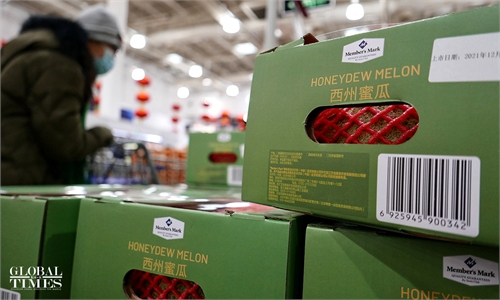
A woman takes photos of balloons at the Disneyland amusement park in Shanghai, east China, Sept. 29, 2020. (Xinhua/Fang Zhe)
Over the past two weeks or so, several foreign companies have become mired in controversy in the Chinese market. Following US chip firm Intel, supermarket operator Sam's Club and German carmaker Mercedes-Benz, US entertainment giant Disney has been on the receiving end of a local backlash.
On Wednesday, pictures and videos of more than 5,000 people lining up outside Shanghai Disneyland at 3 am in the morning to buy the 2021 Duffy and Friends Christmas Collection flooded Chinese social media platforms. It was a scene many businesses would love to see, but many found later that many of the people in line were actually hired scalpers. What followed was a tsunami of criticism directed toward Disney for its "hunger marketing" practices.
Amid growing criticism, Disney on Wednesday night issued an apology for "being unable to meet visitor demand" and said it would improve services. The company did not address the criticism of deploying extreme marketing strategies.
Disney is that latest foreign firm engulfed in controversy in the Chinese market. On Wednesday, many Chinese consumers lined up inside Sam's Club stores in several cities to cancel their membership, out of protest of the company's reported decision to remove products sourced from Northwest China's Xinjiang Uygur Autonomous Region.
Also this week, Mercedes-Benz drew fire over the company's ad featuring a model with "slanted eyes," even after Chinese snack retailer Three Squirrels was blasted for using similar ad. A week earlier, Intel apologized after its letter requesting all suppliers to avoid products and labor from Xinjiang.
The growing list of multinationals encountering difficulties in the Chinese market has attracted global attention. Many foreign media outlets rushed to use the incidents to portray a Chinese market that is increasingly difficult environment for foreign businesses, citing growing hostility toward foreign businesses. Some anti-China forces are trying to use to incidents to further push businesses against China.
Such claims are not worthy of a response, as more foreign businesses, not less, are entering or seeking to enter the vast Chinese market. Moreover, a close analysis of the reasons behind the companies' troubles in the Chinese market would directly and indirectly lead to Washington, where anti-China hostility is running amok. With baseless lies about "forced labor" in Xinjiang, the US government has been forcing US businesses to cut ties with their Chinese partners through a combination of pressure campaigns and actual legislation and laws. That put US businesses in an impossible position, where if they choose to give in to US political pressure, they risk losing Chinese consumers, as we witnessed in the cases of Intel and Sam's Club, among others.
As for Chinese consumers, it is absurd to suggest that there is a growing hostility toward foreign businesses. If anything, it is hostility toward certain arrogant businesses that cater to anti-China sentiment without any regard for China's national interests and respect for Chinese consumers. One thing that is growing, though, is the Chinese public's indignation toward the US' relentless slander and crackdowns against China.
That brings us to the latest case of Disney. On the surface, Disney's offense is different from that of Intel and Sam's Club, because the entertainment company was not criticized for moves against Xinjiang products but for its business practices. In fact, some Chinese companies have also been criticized for using similar marketing tactics.
But what fuels the anger among Chinese consumers toward the US firm is also the growing anger toward the US' bullying tactics, which is associated with the Chinese public's impression of foreign businesses' arrogant and overbearing ways of profiting from the Chinese market.
As Washington continues to step up its anti-China campaign, it is clear that things will only get tougher for US and other foreign businesses in the Chinese market in 2022. But multinationals should and can handle these challenges: Just don't get into politics, and stay true to your original mission of winning over consumers through high-quality products and services.


